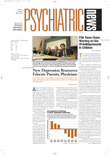Golf is an effort to master one's environment, it was stated at a session at the recent American Psychoanalytic Association meeting (see story at
left).
Psychiatric News asked session participants Richard Harris, M.D., Howard Katz, M.D., and Phil Lebovitz, M.D., about the psychological rewards that a person can receive from succeeding at golf.
PN: What are the chances of a golfer making a hole in one during his or her lifetime?
Harris: I don't think that anyone can expect to make a hole-in-one in their lifetime. It is fairly rare.
Lebovitz: Over the course of the year, there are about 81,000 tee shots on par 3s by PGA Tour professionals. In most years, about one of every 2,500 par-3 tee shots ends up in the hole. And these are the best golfers on the planet. For us amateurs, the chances are closer to one in 20,000 tee shots or greater. Chances of making a hole in one are only slightly better than winning a lottery prize.
PN: What does a hole in one mean psychologically to the golfer who makes it?
Katz: A hole in one is a great pleasure, but a rare event that always includes luck as well as skill.
Harris: From a psychological standpoint, it's a kind of kick, it's almost surreal. It isn't something that you really anticipate happening.
Lebovitz: A hole in one is the equivalent of hitting the perfect golf shot. Golfers live with the constant hope that they will achieve perfection and with the frustration that it so rarely happens. Psychologically, a hole in one enhances one's pride and is narcissistically reinforcing. It makes one feel special, part of an elite group.
PN: How important is a low handicap in golf, psychologically speaking?
Lebovitz: Whereas a hole in one can be chalked up to luck, a low handicap gives the golfer a sense of achievement that is repeatable and reliable. A low handicap provides more substantial bragging rights.
PN: How important is beating competitors in golf?
Katz: My own view is that achievement is quite personal—the development of a sense of mastery that may for some be measured in terms of competitive victories (winning a tournament or a match); for others in achieving a “personal best,” such as breaking [a score of] 90, or 80, or, for the best players, 70; and for others in improving one's average score, as reflected by a lower handicap.
Harris: People can have low handicaps and be very good golfers, but in competition don't do well. For one reason or another, when the pressure is on, they can't perform. So I would say the greatest accomplishment is to win—to beat the competition. And that is where some of the psychological aspects come into play.
